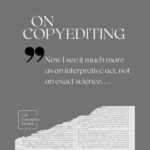 The term has officially begun. That means we here at the mag are reuniting our posteriors with the loving impressions they long ago made in our chairs. Though the office is taking some getting used to, our reading period isn’t. It began earlier this month—August 15, to be exact. So we’re already in the thick of thinning a new crop of submissions. (Editor’s note: Farewell, comfy spot with great light in my neighborhood coffee shop. See ya next summer.)
The term has officially begun. That means we here at the mag are reuniting our posteriors with the loving impressions they long ago made in our chairs. Though the office is taking some getting used to, our reading period isn’t. It began earlier this month—August 15, to be exact. So we’re already in the thick of thinning a new crop of submissions. (Editor’s note: Farewell, comfy spot with great light in my neighborhood coffee shop. See ya next summer.)
As now becomes evident, we’re also back to blogging. And indeed, there is much to blog about. Our new issue has been out there shooting off sparks all summer, and if you didn’t see it, a lovely review of said issue has been wending its way through the web. We follow up on that exceptionally keen assessment of 10.1’s riches with a closer look at Ian Stansel’s fiction offering—considered below by ever-so-delightful volunteer Justine McNulty.
Justine McNulty: In Ian Stansel’s “Traveling Light,” the characters power the piece. Through shifting perspective and free-indirect style, Stansel pulls the reader into each narrator’s unique voice, fears, longing. As we watch these people come together and drift apart, we are left asking ourselves the same thing Edie wonders early on regarding her divorce and the loss of her two stepsons: “What is a person . . . if she is not essential to another?”
The characters’ intimate perceptions lead us through this tale of a brother’s guilty love, a woman’s loneliness, another woman’s search for herself, bodily and spiritually. Paul’s moment of anger at his sister (at the prodding of Edie’s handyman, Tucker) is honest and visceral, and we understand his guilt and the rejection of it, just as we understand Edie’s compassion as she soothes him after his proclamation, “I’m not a good person,” with her own brand of insight: “Who is?” As Margot runs, once again on her own, her isolation is juxtaposed against the hope of Edie and Paul’s future together.
This is a story of people, but more than just the characters enrich and enliven these pages. Stansel writes about all of us here—causing us to reflect on the deepest of human experiences, and what creates our sense of belonging










